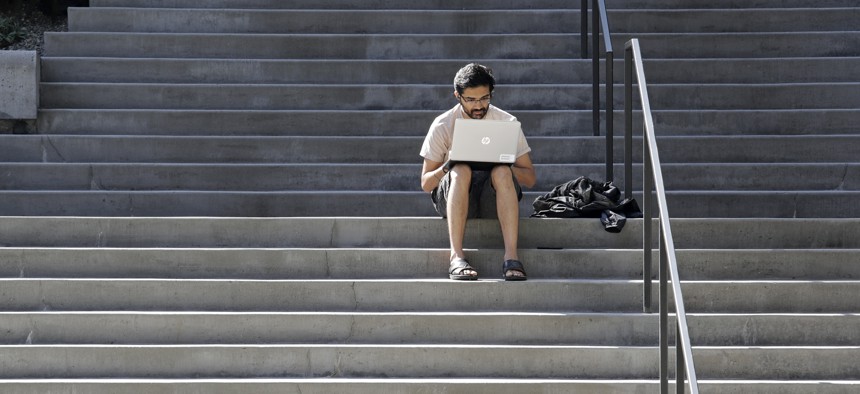A County Expands Internet Access with Remote WiFi Hotspots

Amazon software engineer Aditya Iyer sits alone on steps outside the company headquarters as he works on his laptop Friday, March 20, 2020. AP Photo/Elaine Thompson
By boosting WiFi internet signals at government buildings, New Castle County in Delaware is providing residents places to log on for free in parking lots.
School closures and stay-at-home orders to combat the coronavirus outbreak have made internet access even more of a necessity for Americans, whether they need to log into virtual classrooms, just talk to family members or attend Zoom meetings.
But not everyone has reliable access to the internet. To help connect residents, one Delaware county is creating drive-up WiFi hotspots.
New Castle County has begun building out wireless internet access points at public buildings so residents can connect for free. The idea is for residents to sit in the parking lots of public buildings, including libraries, the county government center and a local police academy, and to log on to Wi-Fi with their own laptops or cell phones, explained County Executive Matthew Meyer.
“You have a situation where the internet was a nice thing to have a few weeks ago, but it is now really necessary if you want your kids to go to school. It’s necessary to keep your job,” Meyer said.
The hotspot build-out has been a relatively cheap and easy endeavor, Meyer said. The county selected locations that already had wireless internet connections and then bought and installed equipment to boost the signals so they became accessible from parking lots. The cost has been a few hundred dollars spent on equipment and required minimal staff time to install the hotspots, Meyer said.
In the first week the WiFi hotspots were in operation at eight locations, nearly 400 unique devices logged on, officials said. The county contracts with Verizon for internet service and partnered with a local business, Assurance Media, to quickly install the technology needed.
WiFi is available 24 hours a day, seven days a week and users can remain in vehicles or sit outside so long as they observe social distancing guidance and remain a safe distance from others, Meyer said.
It’s an idea that’s already catching on elsewhere. Albuquerque, New Mexico announced this week it will provide free internet access at 80 hotspots across the city. The American Library Association has also encouraged the more than 16,000 public libraries across the country to leave their WiFi networks on even if buildings are closed.
Schools across the country have closed their doors, some for the remainder of the academic year. But as schools transition to online learning to keep students engaged, a digital divide has emerged in communities where students do not have reliable access to the internet and computers at home.
According to Federal Communications Commission estimates, 21 million Americans, or 6.5% of the population, lack access to high-speed internet. Outside researchers estimate that closer to 42 million Americans lack access to broadband.
In Delaware, a stay-at-home order is in place and schools are closed through at least May 15.
Meyer, a former teacher, said he’s heard anecdotally from schools officials that 25 to 35% of students in his county may not have the type of reliable access to the internet that they would need to complete online schoolwork. Some households may not have internet service at all, while others may be relying on limited data plans. With people out of work and unemployment claims skyrocketing—about 16.8 million American workers filed for unemployment in the last three weeks—Meyer worries that more residents will cut internet service to save money.
To ensure residents across New Castle County have access, Meyer said officials are examining at least 10 other sites to determine the feasibility of building out existing WiFi capacity.

NEXT STORY: 50 years of bold predictions about remote work: It isn’t all about technology





